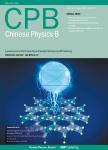Structure-preserving algorithms for the Duffng equation
Structure-preserving algorithms for the Duffng equation作者机构:Department of Mechanics Beijing Institute of Technology
出 版 物:《Chinese Physics B》 (中国物理B(英文版))
年 卷 期:2008年第17卷第10期
页 面:3623-3628页
核心收录:
学科分类:07[理学] 070201[理学-理论物理] 0702[理学-物理学]
基 金:Project supported by the National Natural Science Foundation of China (Grant No 10572021) the Doctoral Programme Foundation of Institute of Higher Education of China (Grant No 20040007022)
主 题:structure-preserving algorithm Duffing equation gradient-Hamiltonian decomposition Runge-Kutta method
摘 要:In this paper, the dissipative and the forced terms of the Duffing equation are considered as the perturbations of nonlinear Hamiltonian equations and the perturbational effect is indicated by parameter ε. Firstly, based on the gradient- Hamiltonian decomposition theory of vector fields, by using splitting methods, this paper constructs structure-preserving algorithms (SPAs) for the Duffing equation. Then, according to the Liouville formula, it proves that the Jacobian matrix determinants of the SPAs are equal to that of the exact flow of the Duffing equation. However, considering the explicit Runge Kutta methods, this paper finds that there is an error term of order p+l for the Jacobian matrix determinants. The volume evolution law of a given region in phase space is discussed for different algorithms, respectively. As a result, the sum of Lyapunov exponents is exactly invariable for the SPAs proposed in this paper. Finally, through numerical experiments, relative norm errors and absolute energy errors of phase trajectories of the SPAs and the Heun method (a second-order Runge-Kutta method) are compared. Computational results illustrate that the SPAs are evidently better than the Heun method when e is small or equal to zero.



